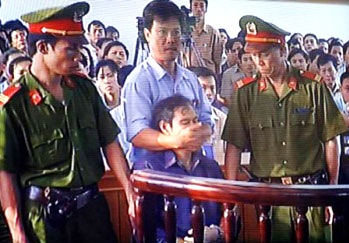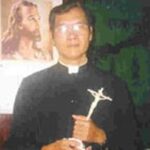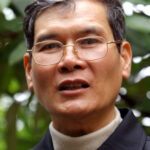Article for The Catholic Times – published in 2010 follows the news of of Fr.Van Ly’s release (May 2016).
Vietnam

- Father Thaddeus Nguyen Van Ly, a human rights campaigner jailed by Vietnamese authorities, was released from prison three days ahead of the May 22 visit by U.S. President Barack Obama to Vietnam. He is pictured in an undated photo. (CNS photo/Kham, Reuters) See VIETNAM-PRIEST-RELEASE May 23, 2016.Read his story at: https://www.davidalton.net/2010/12/23/vietnam-and-religious-liberty/ – House of Lords
Priest in Vietnam released before President Obama’s visit (from the Catholic Herald)
http://www.catholicherald.co.uk/news/2016/05/24/priest-in-vietnam-released-before-president-obamas-visit/
Father Thaddeus Nguyen Van Ly (CNS)
Fr Thaddeus Nguyen Van Ly spent more than two decades in prison and 15 years under house arrest
Fr Thaddeus Nguyen Van Ly, a human rights campaigner jailed by Vietnamese authorities, was released from prison three days ahead of the May 22 arrival of US President Barack Obama.
In photos released by the Archdiocese of Hue, the 80-year-old priest can be seen kneeling — with assistance — before the archbishop upon his return to his parish, reported ucanews.com. The archdiocese reported that the priest was in good health.
Ordained in 1974, Fr Ly had spent more than two decades cumulatively in prison and 15 years under house arrest on a range of charges related to his activism. The latest arrest dated back to 2007, when he was sentenced to eight years in prison and five years house arrest on anti-government activities. He was released in 2010 to get treatment for a brain tumor, only to be reimprisoned the following year.
Fr Ly had been an outspoken rights activist, campaigning for democracy and freedom of speech and speaking out against the government confiscation of church property.
While his release was welcomed by the US government, his sentence was about to end regardless. Arrested on February 19, 2007, Fr Ly was handed an eight-year sentence that was suspended between March 15, 2010, and July 25, 2011, meaning he was released barely one month short of serving a full eight years. It is unclear whether he still faces a five-year probationary house arrest that was part of the original sentencing, ucanews.com reported.
A priest in Hue City who asked not to be named told ucanews.com that government officials informed Archbishop Francois Xavier Le Van Hong of Hue that Fr Ly would be granted a special reprieve for the 126th anniversary of Ho Chi Minh’s birthdate of May 19.
“The Communist government rarely releases prisoners of religious freedom and conscience on that occasion. Fr Ly was pardoned due to the government bowing to pressure from the US government,” the priest explained. “The government made this concession to the US so as to get financial support from Obama’s visit.”
Rights groups have been pressing President Obama to use his trip to push the Vietnamese government to release political prisoners and tie trade deals to human rights. An estimated 130 people are currently imprisoned for acts of peaceful dissent, according to the International Federation for Human Rights. Last month, a coalition of 19 groups, including Christian Solidarity Worldwide and Human Rights Watch, sent an open letter to President Obama highlighting attacks on defenders of human rights and religious freedoms.
“We therefore strongly urge you to take the opportunity of your visit to Vietnam to make clear, both in private and in public, that US-Vietnamese relationship will not fundamentally advance absent meaningful human rights improvements, including the release of imprisoned activists, an end to harassment of civil society groups, and respect for international law,” the letter read.
————————————————————————–
Article for The Catholic Times (2010) about Fr.Thaddeus Van Ly and religious freedom in Vietnam – following a visit to Hanoi when Fr.Van Ly was released, only to be re-arrested.
Vietnam
In a cruel reversal of roles, one of Vietnam’s leading human rights lawyers, Nguyen Van Dai, has been fighting for his liberty in his country’s courts. Dai is a Christian who has, for many years, along with ten other vociferous advocates for religious liberties, entered the Vietnamese courts to defend persecuted Christians.
The story of Christian persecution in Vietnam is not a new one.
When, in 1954, having routed the French, Ho Chi Minh, took control of the north, convents, church schools and hospitals were confiscated. 900,000 people fled to the South (500,000 were Catholic). In 1975, at the culmination of the War with the Americans, religious institutions in the south of the country suffered the same fate.
During a visit to the former central prison in Hanoi, built by the French, I saw where colonial rulers imprisoned nationalist leaders seeking to overthrown colonial rule. The leg irons, manacles, and guillotine are all a vivid reminder of the harrowing and brutal methods used to subdue dissidence. Sadly, many of the cruelties have persisted and are visited upon today’s dissenters by the country’s Communist rulers.
In the 1970s many Catholics came to know the story of the late Vietnamese Cardinal, Francois Xavier Nguyen Van Thuan. He spent 13 gruelling years in Vietnamese prison. I was struck when I once met him how easy we have it in comparison.
These days, many people assume that the persecution of men like Cardinal Thuan is a thing of the past – but cases like that of lawyer Dai and a brave Catholic priest, Fr.Thaddeus Nguyen Van Ly, underline what an error it would be to make that assumption.
It is often assumed that persecution is a thing of the past – or reserved for the tribal peoples who supported the United States during the Vietnam War.
It is true that the Vietnamese government has particularly targeted minority hill-tribe Christians such as the Degar people and Hmong. As the authorities reportedly made it their goal to eliminate Christianity within those groups many Hmong Christian leaders fled their villages and now live in the forest or in caves to escape this religious persecution. At least 20 Hmong pastors have been imprisoned in Vietnam for their Christian faith.
There are about 600,000 tribal people from 30 different groups in the central highlands. Two thirds are Christian, both Catholic and Protestant. Their assistance they gave the US army during the War is something they have never been allowed to forget; and they have been subjected to a massive retaliatory campaign.
Their children have been denied education if their parent’s practice Christianity; soldiers and police have forced believer to renounce their faith and drink pig’s blood (a pre-Christian practice) and Martial law was imposed throughout the central highlands.
But, as the case of lawyer Dai illustrates, it would be another error to think that persecution is either a thing of the past or confined to ethnic groups like the Hmong.
Last year lawyer Dai began to challenge the very nature of the totalitarian State in which he lives.
He spoke out for political as well as religious freedoms, particularly the creation of a multi-part democracy in this one-party State. It was a step too far and in early March, police arrested Dai along with 28-year-old fellow activist and lawyer Le Thi Cong Nhan for “propagandizing” against the Vietnamese republic. Dai rebutted the charge stating unequivocally that he had simply exercised his right to free expression and association.
Since that all-too-familiar midnight knock on the door by police officers, and following his seizure and arrest, Dai has been spirited away to an unknown destination. His wife, who tried to take a Bible to him was refused details of his whereabouts and before his court appearance, earlier this month, nothing was seen or heard of him.
On May 11th he was dragged before the Hanoi Peoples Court and they sentenced Nguyen Van Dai- who is aged 38 – to five year’s imprisonment to be followed by four years of house arrest. Le Thi Cong Nhan – who is 28 – was sentenced to four years imprisonment, to be followed by three years of house arrest.
Both Dai and Nhan are members of an international religious liberties organisation, Advocates International, who are lawyers who take up religious liberties issues. This is the first time, since the organisation was founded 16 years ago, that the tables have been turned on the advocates themselves, with lawyers being thrown into jail.
On paper, Vietnam professes to permit free speech; but the reality is often very different.
Chapter Five, Article 69 of the Vietnamese Constitution states: “The citizen shall enjoy freedom of opinion and speech, freedom of the press, the right to be informed, and the right to assemble, form associations and hold demonstrations in accordance with the provisions of the law.”
In reality, Article 88 of the Criminal Code, which makes it illegal to ‘conduct propaganda against the Socialist Republic of Viet Nam,’ is used punitively and widely to intimidate and suppress free speech and opposition. Constitutional rights are thereby rendered worthless.
In the Vietnamese media the Christian lawyers have had their characters assassinated and have been demonised as extremists, associates of terrorists, and dangerous radicals. One Communist official has thrown in blatantly false allegations that they have “conspired with criminals and even terrorist organisations responsible for kidnappings, bombings and assassinations to undo much of the progress the country has made.” The “terrorist” organisation is later referred to as the Vietnam Reform Party.
The tirade of Le Quoc Minh – the deputy chief of the regime’s propaganda department – then spells out Dai’s real crime. He says:
Dai “is alleged to have abused the right to freedom of speech by posting information on the internet and giving interviews to overseas Vietnamese-owned radio stations where he painted a biased and distorted picture of the country and its internal affairs.
The authorities then attack Dai for obtaining funds from overseas to fund scholarships for law students who have travelled to Thailand to study
Le Quoc Minh also claims: “Dai had instructed staff from his Thien An law office to travel to north-western, Central Highlands and southern provinces to contact Protestant clergymen and their followers who have shown hatred towards the Government.”.
“Together they compiled ‘evidence of Viet Nam’s suppression of the Protestant religion’ and gave it to the US-based Committee for Religious Freedom in Viet Nam and to the US Embassy in Viet Nam.” Officials said “their findings were doctored, distorted or fabricated to further the aims of Dai and his organization.”
That Dai’s trial verdict was pre-determined – and his court appearance a charade is illustrated by the Government’s pre-trial press release which concluded with the statement that ” . . . the law will not allow a tiny minority to harm the interests of what the vast majority believe in as a nation and as a people.” This trial was over and the outcome decided before it ever began.
The imprisonment of Dai and Nhan are not isolated events and come on the back of the recent decision to jail one of the country’s most courageous Catholic priests.
In April, in the central city of Hue, Father Nguyen Van Ly (pronounced Lee) was sentenced to an eight-year jail term. This is not the first time he has been imprisoned. In January 2003, I travelled to Hanoi and met senior Communist officials in order to plead for clemency for Fr.Van Ly. After an international campaign highlighting his case the 6-year-old priest was ultimately freed.
For more than 30 years Fr.Van Ly has been a well known champion of democratic and pluralist values. The priest is accused of being a founding member of Bloc 8406, a pro-democracy movement launched a year ago. He is also a member of the Progression Party of Vietnam. That is a crime in a country where only one party – the Communist Party – is allowed to exist. Like lawyer Dai he is also charged with having communicated with pro-democracy activists living in other countries.
At the time of his arrest in April, Fr. Van Ly had already spent 14 of the past 24 years in prison and he had been under house arrest since February. Two men and two women who have been working with Fr.Van Ly were jailed with him. Anyone who challenges Communist hegemony is deemed subversive and an enemy of the State.
Photographs of Fr.Van Ly being gagged and dragged from the court – and which have been seen around the world – have been a stark reminder that Vietnam, despite being given the respectability last December of membership of the World Trade Organisation, it remains a repressive and coercive society. It is a country which will allow pietistic religion but it will not tolerate religious freedom or the right of church leaders to make social comment.
Fr.Van Ly’s show- trial – like the trials of Dai and Nhan, made a mockery of any concept of justice. In what was a kangaroo-court, with no pretence of impartiality of fairness, the trail lasted a single day. Fr. Van Ly was brought before the court in handcuffs. He bravely refused to recognise the right of the Communist judges to try him. Refusing to stand up before the court he denounced the Vietnamese Communist Party. With police officers covering his mouth, he was physically dragged from the courts and kept in a room where with video link while the Star Chamber court proceeded with his trail. Fr.Van Ly and the four other co-defendants were not represented by lawyers, and were removed from the courtroom at one point, with the priest shouting “Vietnam practices the law of the jungle.”
The jungle is not a new experience for this brave man. He has been here before.
After his arrest in May 2001 he was also forced to stand trial without a defence lawyer or public audience. Then he was sentenced to 15 years in solitary confinement followed by five years on probation.
That time he was arrested at An Truyen church in central Thua Thien-Hue province, for his alleged ‘failure to abide by the decisions on his probation issued by authorized State agencies.’.
For more than 30 years Father Van Ly has peacefully campaigned for improved religious freedom in Vietnam and he has been regarded as a thorn in the side by the Communist authorities. His real crime, in 2001, was sending an appeal out of the country publicising Vietnam’s continued repression.
In a written testimony submitted to the US Commission on International Religious Freedom in February 2001, he called on the Communist Government to make significant improvements to religious freedom. He called on officials to allow the churches to appoint their own priests, to stop listing a person’s religious affiliation on their ID card, to return confiscated property and to release those held for their religious beliefs. He had urged the Congress to postpone the ratification of a bilateral trade agreement while religious persecution persisted.
When I travelled to Vietnam in 2003 Fr.Van Ly was being kept in solitary confinement in Nam Ha province. He was bared from speaking to the guards who bring him his food and drink twice a day. During a rare visit from relatives, he said: “My duty and my conscience required me to fight for the freedom of our Church. If I had realized those terrifying situations for our Church and had not done anything, I would have been guilty before God. Now I think I have accomplished my duty, I do not feel sorry for myself.”
During my visit to Hanoi I raised Fr.Van Ly’s case with Le Quang Vinh, head of the Vietnamese Government Committee on Religion.
Quang Vinh denied that religious persecution occurs in Vietnam and says that people like Father Van Ly have been arrested for acting subversively against the Communist Party: “It was not because he contacted the Congress” he said. “Van Ly tried to upset the people. He encouraged their illegal right to own land; he lied that there was no true freedom in Vietnam, and he refused to obey the authorities and accept their control. He armed his group to fight the authorities.”
When I asked him where Fr.Van Ly bought his guns and weapons he replied that “they had sticks and knives, not guns.”
The reality is that a group of about 35 frightened parishioners had gathered for sanctuary in his church. The church was surrounded by 600 armed security officers and as Father Van Ly prepared to say Mass he was arrested. Although Quang Vinh told me that I could not visit Fr.Van Ly, he did promise to place our plea for clemency before the Prime Minister; and he was subsequently released. It shows that pressure can make a difference; and that if Vietnam is ever going to become a more tolerant society, respectful of divergent points of view and beliefs it will be because of international pressure.
In Britain we can make representations on behalf of Fr.Van Ly and lawyers Dai and Nhan by writing to the Vietnamese Ambassador, at 12 Victoria Road, London W8. Isn’t their bravery and the price they have aid for their beliefs worth the price of a postage stamp and the time it takes to write a letter?



